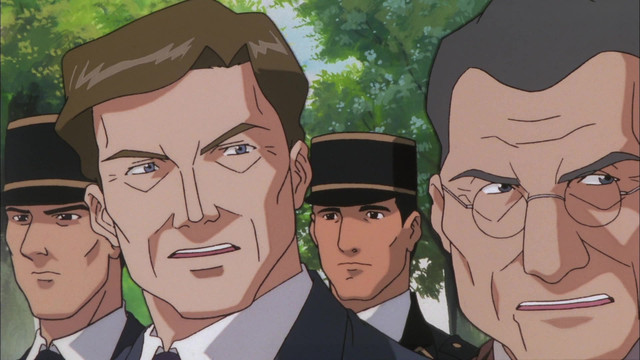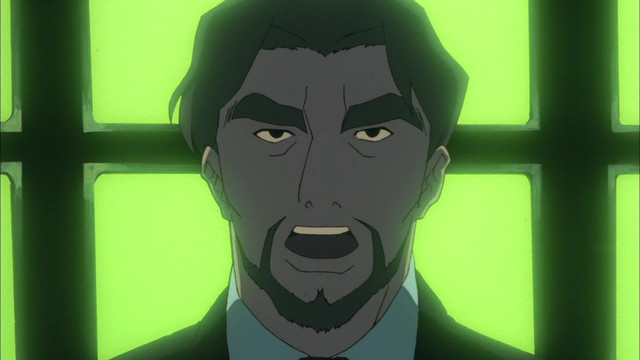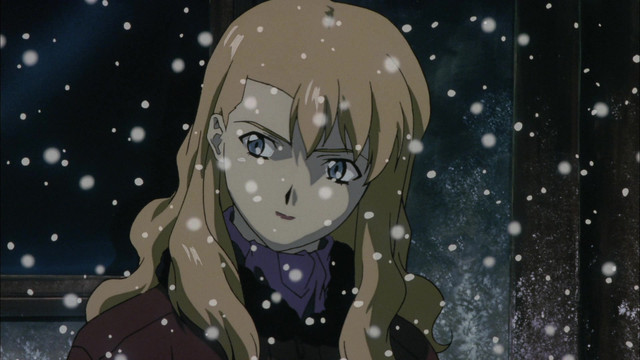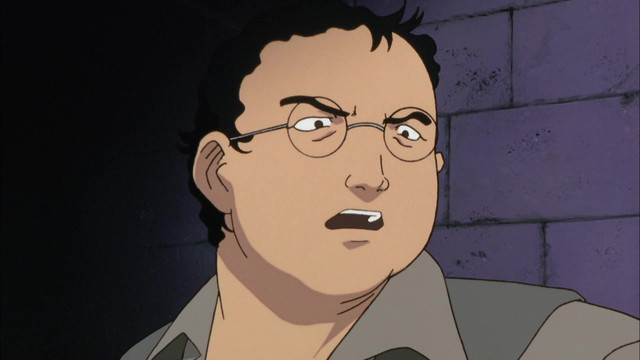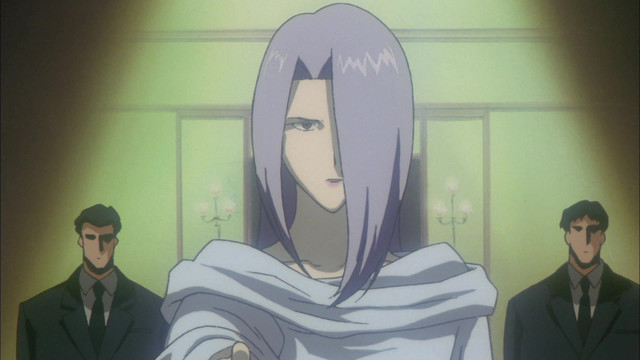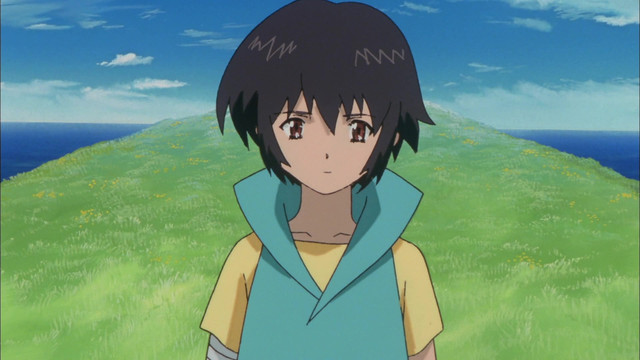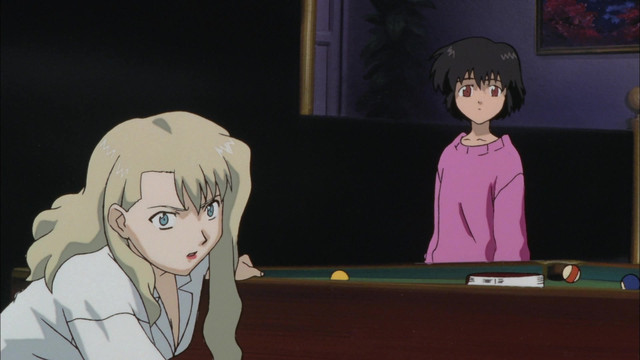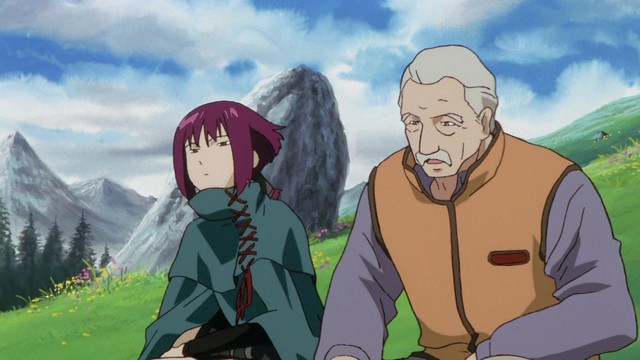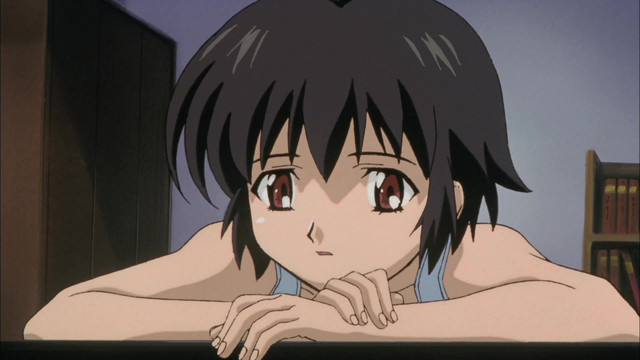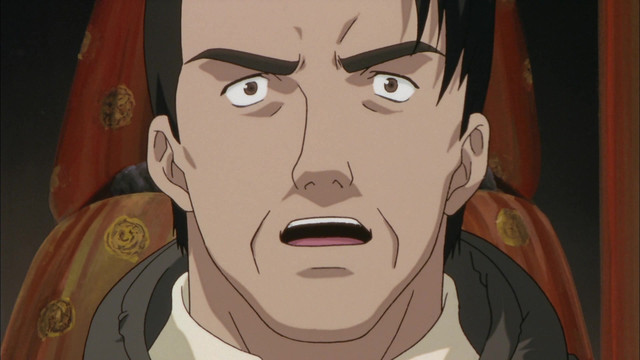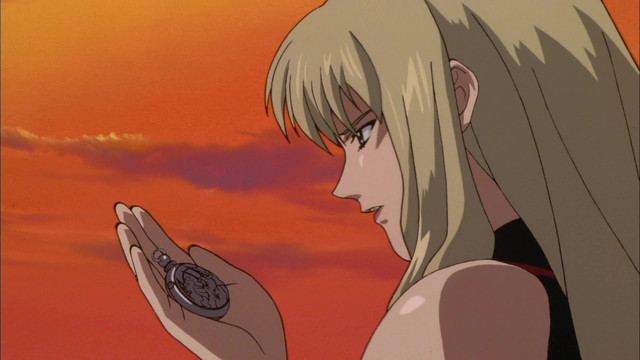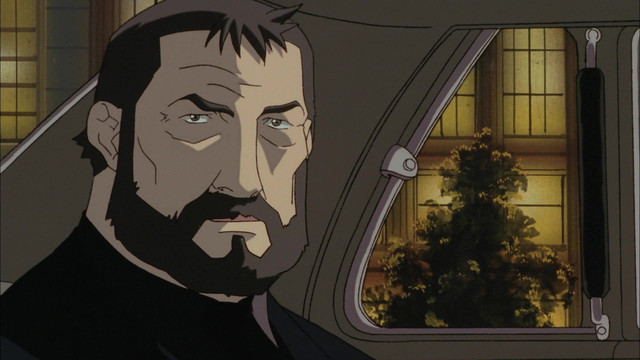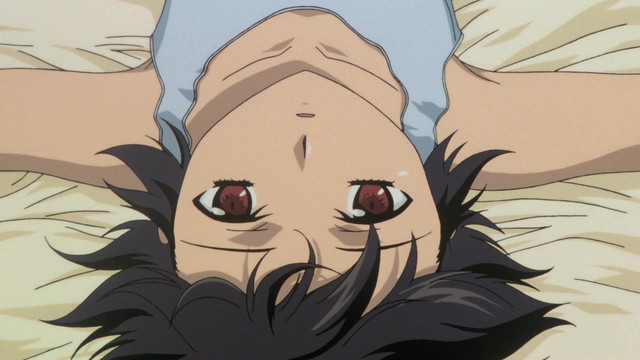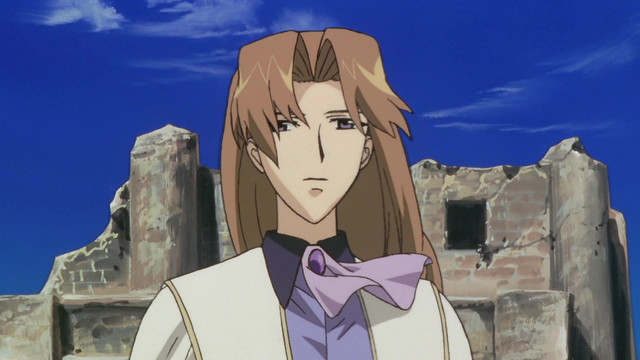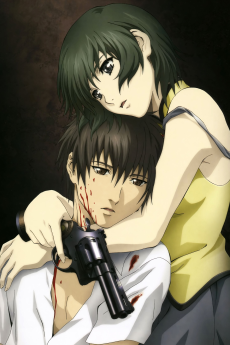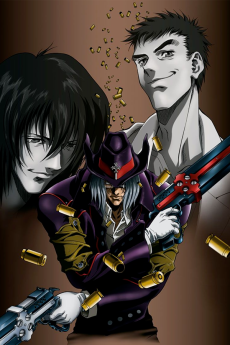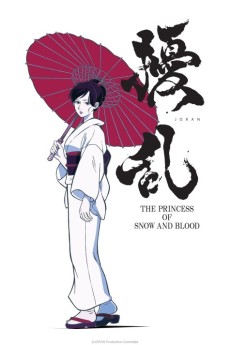NOIR
STATUS
COMPLETE
EPISODES
26
RELEASE
September 28, 2001
LENGTH
24 min
DESCRIPTION
Mireille Bouquet is a professional assassin, and a very good one at that. But when she follows up an e-mail from a young Japanese girl named Yumura Kirika, inviting her to take "a pilgrimage to the past", her life becomes even more dangerous than it already is. Now, with a haunting melody invoking the memory of an event long past, Mireille and Kirika decide to work together to find the truth about a thousand year old organization that has controlled both of their lives since before they were born. And the only clue in their search, the only thing Kirika remembers about herself, becomes their working codename: a name designating an ancient fate, of two maidens who reign over death--Noir.
(Source: Anime News Network)
CAST
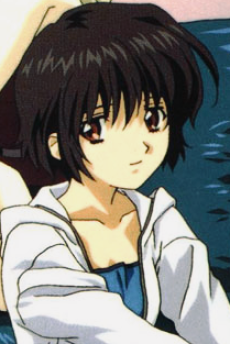
Kirika Yuumura

Houko Kuwashima

Mireille Bouquet

Kotono Mitsuishi

Chloe

Aya Hisakawa

Altena

TARAKO

Yuri Nazarov

Katsunosuke Hori

Silvana Gleone

Yumi Touma

Dominiques
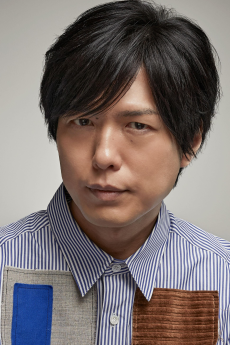
Hiroshi Kamiya

Milosh

Toshihiko Seki

Belladonna

Fumiko Osaka
EPISODES
Dubbed
REVIEWS

CreativeUsername39
90/100Is Noir a forgotten masterpiece, or is it perhaps forgotten for a good reason?Continue on AniListNOTE: This review can also be found on my MAL profile, just in case anyone comes across it on that site and thinks that this one is plagiarising it (Link: https://myanimelist.net/reviews.php?id=357142).
Noir is a by now rather obscure action series, which began the Girls-with-Guns trilogy. Three shows produced by Bee Train that were not connected plot-wise, but all had similar themes and set-ups (the other two being Madlax and El Cazador de la Bruja). None of them are particularly highly rated on MAL, the critical reception of each of them seemingly fairly lukewarm. So are they underappreciated gems that deserve more recognition, or is there a good reason as to why they’ve been forgotten over the years?

Noir is somewhat similar to the much more popular Cowboy Bebop in a way that it presents its narrative. Most of the show is very episodic, focusing on the one-off adventures of the assassins Mireille Bouquet and Kirika Yuumura. Unlike the other series however, there is a link between the episodic stuff in Noir, but what the link is exactly would be a major spoiler, so I will not say here.
I found the vast majority of these episodes to be very enjoyable and well-written. Most of them are fairly simple and straight forward but they still offer good action and interactions between characters. It is during these episodes where the strange and interesting relationship between Mireille and Kirika grows. I don’t think I’ve ever seen a dynamic similar to the one between these two in any other anime. Throughout the show, they are mostly just tolerant of each other but not much else. Their circumstances and personalities don’t allow for many particularly friendly interactions. And yet somehow, there is still chemistry between them. While they are few and far between, the show does nonetheless allow the leads to have brief moments where they seem to genuinely appreciate each other’s company. Quick scenes where the two simply have a normal conversation, where one brings a smile to the other’s mouth. Those little moments built upon each other and managed to become something that felt genuine and it made the way the two characters developed off of one another believable. Which was important, seeing how their relationship is the backbone of the series.

The main story developing in the background of the episodic adventures is also interesting. The villains actually ended up having a genuinely intriguing backstory as well as worldview. Especially the series’ main villain, Altena, whom I find to be one of the most compelling anime sociopaths of all time (as well as one of the most underrated ones). She is cruel and ruthless with deeply twisted morals and views, yet she brilliantly hides her nature under the calm, motherly exterior, as seen in her interactions with the leads, as well as her apprentice, Chloe. It is this contrast that makes her so unnerving whenever she is on screen. And yet she is not purely evil. It is implied that, in her own creepy way, she does genuinely care for Chloe and even Mireille and Kirika to an extent, and in the end, she really is simply trying to do what she thinks is best for the world. And those “positive” traits made her even more disturbing. She really was a villain I simply adored to hate.

It’s hard to talk about Noir without bringing up Chloe, the secondary villain and Altena’s right hand, who is just as complex as her higher up, but far more sympathetic. Chloe is a strange character and I mean that in the best way. There are times throughout the series where she seems almost sweet. Her moments with Altena (whom she views as her mother figure) as well as with one other character later in the series show her as affectionate and loving towards the people she feels close to. A contrast to how she behaves throughout most of the series. A cold killing machine. This duality is what makes Chloe complex. She is not an evil or cruel person, but Altena’s upbringing has twisted her morals and caused her to have no qualms about killing in the name of her beloved mentor-mom. You can see how, if it weren’t for Altena’s influence, she could have just been a perfectly normal girl. Chloe’s character is deeply tragic due to the fragility of her psyche that hides beneath the cold and collected exterior. It all also does a good job making the character of Altena all the more deplorable to the viewer.
The soundtrack is up to the usual standard one would expect from Yuki Kajiura. The woman who scored shows such as Fate/Zero, Sword Art Online and Madoka Magica (my all-time favourite soundtrack). The voice acting is solid all around. I’ll admit that I watched this one dubbed, but it is a good dub. Shelley Calene-Black, Monica Rial, Hilary Haag and Tiffany Grant all portray their characters very well, truly making their personalities and emotions come through. And the supporting cast is mostly just plain serviceable. Not very many of them really stand out, but I don’t recall any particularly bad performances either.

Unfortunately, the aspect of the series that I can’t quite bring myself to praise is the animation. It’s not awful it’s just a bit…clumsy I suppose. A lot of the time it feels like it lacks detail which becomes especially apparent during the action scenes. While they are well put together and entertaining, things such as the lack of blood become quite noticeable. Sometimes it kind of looks like, a character drops dead upon just having a gun pointed at them.
If I were to nitpick, there are a few episodes that feel a bit weaker than others, as well as an occasional forgettable villain-of-the-week.
Overall, I consider Noir to be a great and highly underrated series. While it’s undoubtedly flawed in the animation department, it is an incredibly well put together story filled with interesting and memorable characters and spectacular music. As I’m concerned, it was a solid start to the Girls-with-Guns trilogy.

planetJane
92/100The red dream of a black cat.Continue on AniList
All of my reviews contain __spoilers __for the reviewed material. This is your only warning. __Note__: This is a review of the __English Dub__.
In the shadows, nameless assassins load their pistols. The bullets in the chamber end the lives of the rich, the powerful, the damned. It happens everywhere; abandoned construction sites in Japan, the coasts of South America, the heart of Paris, just outside the Arc de Triomphe, the glittering skyscrapers of New York City, the cold landscape of Russia, just before winter's first snowfall. It happens by the hands of two women, hitmen without equal, twin goddesses of death. The result? Something between an action movie and a slow-burn nightmare, filled with pinging gunshots, glinting dagger blades, and poisonous incense. Enter this dreamy vein and you find ___Noir___; a haunting, gauzy series whose emotional and literal palette is dark and thick as tar pitch. Fitting enough for something whose title is just the French word for "black."
 The reference point here is of course film noir, the genre of black and white movies. But Noir's inspiration is less a direct aping of tropes and more a signal that it intends to replicate that movement's sense of mood and place. Indeed, even as Noir's marriage of action movie tropes and dramatic, philosophical dialogue spins out into a storyline of rival assassins and inherited codenames spanning the globe and across time, it never loses that sense of dreaminess, underscored by the lack of blood despite all the violence. This is the aspirational case for highly stylish death-dealing as compelling psychodrama. Firefights are frequent enough to be something you can set your watch to, but every one punctuates big-question themes of loss, fate, memory, revenge, and of course, death.
Our twin deathbirds are Yuumura Kirika [__Monica Rial__] and Mireille Bouquet [**Shelley Calene-Black**]. Kirika is an amnesiac Japanese high schooler whose almost supernatural abilities as a hitman seem impossible for someone her age. Mireille, the older of the two by a good five years, is the only remaining member of a powerful Corsican crime family. Together, the two work under the codename Noir, the moniker of a legendary assassin who's stalked Europe for a thousand years, and take on various hit jobs to make ends meet while pursuing their deeper goals. All the while, their alliance is an uneasy one; sometimes friends, sometimes more than friends, and yet other times keeping each other at arm's length, they are united by a sworn pact and, as eventually becomes clear, a shared history.
The reference point here is of course film noir, the genre of black and white movies. But Noir's inspiration is less a direct aping of tropes and more a signal that it intends to replicate that movement's sense of mood and place. Indeed, even as Noir's marriage of action movie tropes and dramatic, philosophical dialogue spins out into a storyline of rival assassins and inherited codenames spanning the globe and across time, it never loses that sense of dreaminess, underscored by the lack of blood despite all the violence. This is the aspirational case for highly stylish death-dealing as compelling psychodrama. Firefights are frequent enough to be something you can set your watch to, but every one punctuates big-question themes of loss, fate, memory, revenge, and of course, death.
Our twin deathbirds are Yuumura Kirika [__Monica Rial__] and Mireille Bouquet [**Shelley Calene-Black**]. Kirika is an amnesiac Japanese high schooler whose almost supernatural abilities as a hitman seem impossible for someone her age. Mireille, the older of the two by a good five years, is the only remaining member of a powerful Corsican crime family. Together, the two work under the codename Noir, the moniker of a legendary assassin who's stalked Europe for a thousand years, and take on various hit jobs to make ends meet while pursuing their deeper goals. All the while, their alliance is an uneasy one; sometimes friends, sometimes more than friends, and yet other times keeping each other at arm's length, they are united by a sworn pact and, as eventually becomes clear, a shared history.

 Kirika is introduced to us when she sends Mireille an e-mail, containing a cryptic comment about taking a pilgrimmage to their respective pasts and an audio file, recorded from a silver pocket watch, that plays a haunting melody from Mireille’s own. When they meet, they’re almost immediately attacked by throngs of faceless assailants. This opening action piece sets the tone in many ways, as all of the elements Noir will follow are here; Kirika being so good at killing that she can hang a man by his necktie without a second thought, Mireille holding her own but being equal parts stunned and unnerved by Kirika’s abilities. All this while the two exchange gunfire with the nameless men pursuing them in a construction site that serves as a murderous, surreal jungle gym. Even the use of light and shadow, the look of Noir itself, is laid out in these first fifteen or so minutes. Eventually, the gunsmoke clears, and Mireille offers Kirika her terms: the two will help each other discover who the amnesiac Kirika really is and why she has a pocket watch once owned by Mireille’s late parents. Then, when the truth is clearer than light, Mireille will kill Kirika. The schoolgirl accepts, and our story begins.
Thus set is the stage for a heavy, dramatic narrative. Both of our leads are seeking answers from their pasts. Kirika wants to know who she is, the ordinary self she’s convinced lies underneath all of the murderous conditioning. Mireille has a more concrete goal; she wants to know who killed her parents and brother, and why they did it. These two seemingly parallel roads meet under the sinister gaze of Les Soldats, the show’s assassin-death cult-Illuminati, a powerful force that veils the entire world in a suffocating black shroud, and the main antagonists of the series.
Early episodes, though, touch on the Soldats only briefly, or not at all. They aren’t introduced until several episodes in, and they’re more of a background presence throughout the first half of the series. These earlier, episodic adventures are more defined by the locales the main duo visit and who they take out while they’re there, emphasizing action and mood-setting as opposed to the strong central through-line that soon develops.
Even still, there’s a streak of profound melancholy that runs through Noir from its very first episode. Despite its excellent action, this is not a show that boils down to a mindless exchange of bullets. Kirika’s quest for identity in particular is central to the series from its very beginning. An early episode sees her befriend a lost cat, first comparing herself to it and then remarking that since the cat is only lost *physically*, they aren’t truly that similar at all.
Kirika is introduced to us when she sends Mireille an e-mail, containing a cryptic comment about taking a pilgrimmage to their respective pasts and an audio file, recorded from a silver pocket watch, that plays a haunting melody from Mireille’s own. When they meet, they’re almost immediately attacked by throngs of faceless assailants. This opening action piece sets the tone in many ways, as all of the elements Noir will follow are here; Kirika being so good at killing that she can hang a man by his necktie without a second thought, Mireille holding her own but being equal parts stunned and unnerved by Kirika’s abilities. All this while the two exchange gunfire with the nameless men pursuing them in a construction site that serves as a murderous, surreal jungle gym. Even the use of light and shadow, the look of Noir itself, is laid out in these first fifteen or so minutes. Eventually, the gunsmoke clears, and Mireille offers Kirika her terms: the two will help each other discover who the amnesiac Kirika really is and why she has a pocket watch once owned by Mireille’s late parents. Then, when the truth is clearer than light, Mireille will kill Kirika. The schoolgirl accepts, and our story begins.
Thus set is the stage for a heavy, dramatic narrative. Both of our leads are seeking answers from their pasts. Kirika wants to know who she is, the ordinary self she’s convinced lies underneath all of the murderous conditioning. Mireille has a more concrete goal; she wants to know who killed her parents and brother, and why they did it. These two seemingly parallel roads meet under the sinister gaze of Les Soldats, the show’s assassin-death cult-Illuminati, a powerful force that veils the entire world in a suffocating black shroud, and the main antagonists of the series.
Early episodes, though, touch on the Soldats only briefly, or not at all. They aren’t introduced until several episodes in, and they’re more of a background presence throughout the first half of the series. These earlier, episodic adventures are more defined by the locales the main duo visit and who they take out while they’re there, emphasizing action and mood-setting as opposed to the strong central through-line that soon develops.
Even still, there’s a streak of profound melancholy that runs through Noir from its very first episode. Despite its excellent action, this is not a show that boils down to a mindless exchange of bullets. Kirika’s quest for identity in particular is central to the series from its very beginning. An early episode sees her befriend a lost cat, first comparing herself to it and then remarking that since the cat is only lost *physically*, they aren’t truly that similar at all.
 That cat belongs to a former Soviet prison camp commander, one who used that position to further an ethnic conflict between his own people and another group, rounding up the latter and sending them to their deaths. When the duo, tasked with killing this man, actually meet him, what they find is an old man who devotes his every waking hour to feeding the poor and homeless.
Setting aside that these kind of complete moral 180s don’t really happen very often in the real world, Noir asks a very pointed question here, the first hint at a larger overall theme. Does this turnaround actually matter? It is certainly a good thing to be helping the needy, but it doesn’t revive the people he’s murdered. This one of the show’s more extreme extensions of one of its basic ideas, that of killers of all sorts are notably distinct from regular society in a way that isn’t reversible. The notion permeates Noir. So too does the dichotomy between this underworld and the “daylight” world of ordinary people, who are rarely ever particularly relevant in this series. When they are, it’s to draw attention to this painful contrast.
Take, for example, in episode 4 when Kirika and Mireille fly to South America. There, they assassinate the head of a private military company called Atride, who are aiding an ongoing coup d’etat. After killing the man, Kirika unknowingly crosses paths with his daughter, who doesn’t yet know that her father is dead. We never see her reaction at all, in fact. The emphasis is not put on the victims, or those they leave behind. The grieving families are left implied, and the pain permeates the series in only an indirect way. Instead, the focus is squarely on the staining of the killers’ hands, and, by implication, their souls.
This isn’t to say that Noir is moralizing. It really isn’t, certainly not in comparison to some other anime from this time period that I’ve reviewed on this site. It’s more of a question than a strong stance; are these methods worth it? Does it ever result in anything but violence begetting violence, down through the generations, again and again? Noir is much more an interrogative work than it is one that’s keen to offer up clear, simple solutions.
If you, personally, want to either exonerate or condemn the Noir duo, you’re certainly free to. As the series hands you more than enough evidence to do either. In the former column, the world is arguably better off without most of the people they kill; the aforementioned PMC CEO and prison camp commander, French right-wing extremists, Mafia dons, Triad elders, etc. In the latter column, there’s the obvious counter that they’re still killing people extrajudicially based on not even their own judgement but the judgement of those who hire them. But making moral calls like this, in either direction, risks getting lost in the weeds. It’s fair to raise the point that if Noir does not want to be seen as endorsing some form of real world politics, it should not have its main characters involve themselves with so many political conflicts, but the series’ focus on the question of violence as an acceptable tool (or not) of change is more general and philosophical than tied to any movement in particular. Again, it must be emphasized that this is a recurring idea throughout the series. The notion that violence begets itself. As one of the duo’s one-arc enemies—Silvana [**Heather LeMaster**], the scion of a Mafia family—puts it, only blood can wash out blood.
That cat belongs to a former Soviet prison camp commander, one who used that position to further an ethnic conflict between his own people and another group, rounding up the latter and sending them to their deaths. When the duo, tasked with killing this man, actually meet him, what they find is an old man who devotes his every waking hour to feeding the poor and homeless.
Setting aside that these kind of complete moral 180s don’t really happen very often in the real world, Noir asks a very pointed question here, the first hint at a larger overall theme. Does this turnaround actually matter? It is certainly a good thing to be helping the needy, but it doesn’t revive the people he’s murdered. This one of the show’s more extreme extensions of one of its basic ideas, that of killers of all sorts are notably distinct from regular society in a way that isn’t reversible. The notion permeates Noir. So too does the dichotomy between this underworld and the “daylight” world of ordinary people, who are rarely ever particularly relevant in this series. When they are, it’s to draw attention to this painful contrast.
Take, for example, in episode 4 when Kirika and Mireille fly to South America. There, they assassinate the head of a private military company called Atride, who are aiding an ongoing coup d’etat. After killing the man, Kirika unknowingly crosses paths with his daughter, who doesn’t yet know that her father is dead. We never see her reaction at all, in fact. The emphasis is not put on the victims, or those they leave behind. The grieving families are left implied, and the pain permeates the series in only an indirect way. Instead, the focus is squarely on the staining of the killers’ hands, and, by implication, their souls.
This isn’t to say that Noir is moralizing. It really isn’t, certainly not in comparison to some other anime from this time period that I’ve reviewed on this site. It’s more of a question than a strong stance; are these methods worth it? Does it ever result in anything but violence begetting violence, down through the generations, again and again? Noir is much more an interrogative work than it is one that’s keen to offer up clear, simple solutions.
If you, personally, want to either exonerate or condemn the Noir duo, you’re certainly free to. As the series hands you more than enough evidence to do either. In the former column, the world is arguably better off without most of the people they kill; the aforementioned PMC CEO and prison camp commander, French right-wing extremists, Mafia dons, Triad elders, etc. In the latter column, there’s the obvious counter that they’re still killing people extrajudicially based on not even their own judgement but the judgement of those who hire them. But making moral calls like this, in either direction, risks getting lost in the weeds. It’s fair to raise the point that if Noir does not want to be seen as endorsing some form of real world politics, it should not have its main characters involve themselves with so many political conflicts, but the series’ focus on the question of violence as an acceptable tool (or not) of change is more general and philosophical than tied to any movement in particular. Again, it must be emphasized that this is a recurring idea throughout the series. The notion that violence begets itself. As one of the duo’s one-arc enemies—Silvana [**Heather LeMaster**], the scion of a Mafia family—puts it, only blood can wash out blood.
 Noir thrives on contrasts such as these. Once again, this is most obvious with Kirika, whose dark talents are always juxtaposed against her desire for an ordinary life. Sometimes simply represented by her high school ID (a highly symbolic object, the lone remnant of a normal life she may have lived, however briefly), and other times personified by connections that she makes which are ripped away, such as when she learns to draw from tragic character-of-the-day Milosh [**Jay Hickman**], who naturally does not survive his debut episode. It’s present with Mireille too, however, as her comparative involvement with ordinary society is always cut against how profoundly the loss of her parents stung her, and how her past sometimes pops up in unexpected ways to fill her with dread. The largest of all of these contrasts however, is much bigger than any single character. Rather, it’s the twin notions of self-determination and fatalism. The opening spiel at the start of each episode tells us that Noir is “the name of an ancient fate”, and that’s a thought the anime takes very seriously.
In episode 11, around the show’s halfway point, we’re introduced to Chloe [**Hilary Haag**], our third main character.
Noir thrives on contrasts such as these. Once again, this is most obvious with Kirika, whose dark talents are always juxtaposed against her desire for an ordinary life. Sometimes simply represented by her high school ID (a highly symbolic object, the lone remnant of a normal life she may have lived, however briefly), and other times personified by connections that she makes which are ripped away, such as when she learns to draw from tragic character-of-the-day Milosh [**Jay Hickman**], who naturally does not survive his debut episode. It’s present with Mireille too, however, as her comparative involvement with ordinary society is always cut against how profoundly the loss of her parents stung her, and how her past sometimes pops up in unexpected ways to fill her with dread. The largest of all of these contrasts however, is much bigger than any single character. Rather, it’s the twin notions of self-determination and fatalism. The opening spiel at the start of each episode tells us that Noir is “the name of an ancient fate”, and that’s a thought the anime takes very seriously.
In episode 11, around the show’s halfway point, we’re introduced to Chloe [**Hilary Haag**], our third main character.
 Chloe, like Kirika, is a teenage girl who is also a ridiculously skilled hitman, possibly to an even greater extent than Kirika herself. Quite unlike Kirika, Chloe is a Soldat, under the thumb of one of the Soldat leaders, the mysterious priestess Altena [Tiffany Lynn Grant]. Chloe and Kirika are quite quickly established to have a mysterious connection that is only elaborated upon at length toward the very end of the series. They’re on a similar wavelength in general, a fact that clearly disturbs Mireille. All the more troubling is Chloe’s claim of being a “true Noir.” As we eventually learn, that name was originally given to the pairs of agents serving the Soldat high priestess. Our main duo are thus left to consider the idea that their meeting and adopting the Noir codename was determined from the very beginning, a suggestion that only becomes more likely as the show crams detail upon detail into the margins of the characters’ pasts, most especially Mireille’s backstory. I can imagine a certain kind of person finding this overbearing, even convoluted. I’m inclined to accept it for what it is; a further reinforcement of the dreamlike, haunted nature of this entire story.
Chloe, like Kirika, is a teenage girl who is also a ridiculously skilled hitman, possibly to an even greater extent than Kirika herself. Quite unlike Kirika, Chloe is a Soldat, under the thumb of one of the Soldat leaders, the mysterious priestess Altena [Tiffany Lynn Grant]. Chloe and Kirika are quite quickly established to have a mysterious connection that is only elaborated upon at length toward the very end of the series. They’re on a similar wavelength in general, a fact that clearly disturbs Mireille. All the more troubling is Chloe’s claim of being a “true Noir.” As we eventually learn, that name was originally given to the pairs of agents serving the Soldat high priestess. Our main duo are thus left to consider the idea that their meeting and adopting the Noir codename was determined from the very beginning, a suggestion that only becomes more likely as the show crams detail upon detail into the margins of the characters’ pasts, most especially Mireille’s backstory. I can imagine a certain kind of person finding this overbearing, even convoluted. I’m inclined to accept it for what it is; a further reinforcement of the dreamlike, haunted nature of this entire story.
 It’s worth pointing out, too, how all of these characters—our leads of course, but also Chloe and her mysterious handler Altena—are weomen. Noir features a fairly intense homoeroticism, culminating in, when the main duo temporarily break up during the final arc, Kirika referring to Mireille as “my dear Mireille” in a tearful letter. I’ve seen it claimed that Noir has “yuri undertones,” but frankly this seems far too cautious, the show simply has romantic yearning as another thread of its emotional tapestry. This marriage of themes isn’t coincidental, either. Noir seems to suggest that its characters being queer reinforces their outcast nature within society. As queer people, we are present in society’s clockwork, but not truly a part of it, and that separation is only further reinforced by the girls’ occupations. It’d be easy to assume the contrary, that Noir was conflating homosexuality and the girls’ professions to condemn both of them, but this is at odds with the immense humanity that all of these relationships are written with. (And Noir‘s complicated views on violence.) Even the spiny, borderline-yandere obsession Silvana has with Mireille is well-considered, and it goes without saying that Mireille and Kirika’s relationship is the center of the series. Chloe, too, gets a lot of consideration, and when she dies in the final episode, seemingly as punishment for daring to kiss Kirika on the lips just fifteen or so realtime minutes before, it feels less like Noir spitting on a character’s grave and more simply a grim reflection that there are times and places where this sort of thing does, in fact, get you killed.
It’s worth pointing out, too, how all of these characters—our leads of course, but also Chloe and her mysterious handler Altena—are weomen. Noir features a fairly intense homoeroticism, culminating in, when the main duo temporarily break up during the final arc, Kirika referring to Mireille as “my dear Mireille” in a tearful letter. I’ve seen it claimed that Noir has “yuri undertones,” but frankly this seems far too cautious, the show simply has romantic yearning as another thread of its emotional tapestry. This marriage of themes isn’t coincidental, either. Noir seems to suggest that its characters being queer reinforces their outcast nature within society. As queer people, we are present in society’s clockwork, but not truly a part of it, and that separation is only further reinforced by the girls’ occupations. It’d be easy to assume the contrary, that Noir was conflating homosexuality and the girls’ professions to condemn both of them, but this is at odds with the immense humanity that all of these relationships are written with. (And Noir‘s complicated views on violence.) Even the spiny, borderline-yandere obsession Silvana has with Mireille is well-considered, and it goes without saying that Mireille and Kirika’s relationship is the center of the series. Chloe, too, gets a lot of consideration, and when she dies in the final episode, seemingly as punishment for daring to kiss Kirika on the lips just fifteen or so realtime minutes before, it feels less like Noir spitting on a character’s grave and more simply a grim reflection that there are times and places where this sort of thing does, in fact, get you killed.
 That last arc is where Noir tries to answer at least a few of the many questions it raised earlier in the story. To leave out a great many details (both for the sake of preserving some of the show's tricks and to not bog this article down with any further length), Kirika is eventually revealed as being another of the Soldats' trained-from-birth assassins. What's more surprising is that this is also true of Mireille, and her parents' murder stems directly from their refusal, when she was a child, to hand her over to Altena. Altena is revealed to be behind this program of "saplings" in the first place. This raises the obvious question of why she's doing this, and what the Soldats are actually seeking to gain.
Just as our leads take jobs from whoever will pay for them, and pursue no coherent agenda but what they're seeking from their own pasts, the Soldats, similarly, don't seem to be shaping the world to anyone's ends but their own. Power not only corrupts, Noir ventures, it blinds. The Soldats, despite their mystical trappings and Illuminati-coded global reach, are not really any different from any other group of soldiers or guerillas. Lethal violence to reinforce the power of the group is the order of the day, and all else is bloviating self-justification. Altena, despite the motherly countenance she puts on throughout the series, and her own claims that the Soldats were once champions of the oppressed, isn't really doing much more than lying to herself.
That last arc is where Noir tries to answer at least a few of the many questions it raised earlier in the story. To leave out a great many details (both for the sake of preserving some of the show's tricks and to not bog this article down with any further length), Kirika is eventually revealed as being another of the Soldats' trained-from-birth assassins. What's more surprising is that this is also true of Mireille, and her parents' murder stems directly from their refusal, when she was a child, to hand her over to Altena. Altena is revealed to be behind this program of "saplings" in the first place. This raises the obvious question of why she's doing this, and what the Soldats are actually seeking to gain.
Just as our leads take jobs from whoever will pay for them, and pursue no coherent agenda but what they're seeking from their own pasts, the Soldats, similarly, don't seem to be shaping the world to anyone's ends but their own. Power not only corrupts, Noir ventures, it blinds. The Soldats, despite their mystical trappings and Illuminati-coded global reach, are not really any different from any other group of soldiers or guerillas. Lethal violence to reinforce the power of the group is the order of the day, and all else is bloviating self-justification. Altena, despite the motherly countenance she puts on throughout the series, and her own claims that the Soldats were once champions of the oppressed, isn't really doing much more than lying to herself.
 Altena is only given a fairly subtle characterization, in fact. Without close viewing I imagine some might come away from Noir finding her actions nonsensical. The only direct look at Altena’s past we get is through a handful of un-narrated, brief flashbacks. Despite their brevity, they paint a bleak picture; a girl whose home was destroyed by invading soldiers, and whose innocence was stolen from her at gunpoint. How she fell in with the Soldats from there goes unsaid, but it’s easy to make the leap that learning this organization existed, and that they *didn’t help her and her people*, despite their lofty ideals, simply broke her. In her role as a leader of the Soldats, she passes this pain onto her “saplings” in motherly guise. In the final episode, she outlines the real purpose of, at least, her version of the “true Noir.” To simply be a scapegoat for humanity’s worst impulses, to kill for no reason but to perpetuate the killing, again and again, across the globe, and through time.
That fatalistic outlook runs counter to the nihilism (in the neutral sense) of Noir itself, so it’s unsurprising that she doesn’t succeed. In the final episode, Altena’s grand plans come to little, and the final sacrificial victim of her “ritual” is the woman herself. Neither Mireille nor Kirika kill her directly, in doing so breaking Altena’s hold on their lives. Instead, cornered, Altena attempts to get Kirika to shoot her.
Kirika refuses this, choosing to shoulder her actions not under the codename Noir but as herself, attempting to sacrifice herself while saving Mireille and stopping Altena’s plans. In the end, Kirika is saved, and Altena dies without her intervention. The threat gone, our girls cast off the mantle of Noir, and declining any alliance with the remaining factions of the Soldats that remain, they strike out on their own. They may never know peace, but they have each other. In a sense, they are free.
Altena is only given a fairly subtle characterization, in fact. Without close viewing I imagine some might come away from Noir finding her actions nonsensical. The only direct look at Altena’s past we get is through a handful of un-narrated, brief flashbacks. Despite their brevity, they paint a bleak picture; a girl whose home was destroyed by invading soldiers, and whose innocence was stolen from her at gunpoint. How she fell in with the Soldats from there goes unsaid, but it’s easy to make the leap that learning this organization existed, and that they *didn’t help her and her people*, despite their lofty ideals, simply broke her. In her role as a leader of the Soldats, she passes this pain onto her “saplings” in motherly guise. In the final episode, she outlines the real purpose of, at least, her version of the “true Noir.” To simply be a scapegoat for humanity’s worst impulses, to kill for no reason but to perpetuate the killing, again and again, across the globe, and through time.
That fatalistic outlook runs counter to the nihilism (in the neutral sense) of Noir itself, so it’s unsurprising that she doesn’t succeed. In the final episode, Altena’s grand plans come to little, and the final sacrificial victim of her “ritual” is the woman herself. Neither Mireille nor Kirika kill her directly, in doing so breaking Altena’s hold on their lives. Instead, cornered, Altena attempts to get Kirika to shoot her.
Kirika refuses this, choosing to shoulder her actions not under the codename Noir but as herself, attempting to sacrifice herself while saving Mireille and stopping Altena’s plans. In the end, Kirika is saved, and Altena dies without her intervention. The threat gone, our girls cast off the mantle of Noir, and declining any alliance with the remaining factions of the Soldats that remain, they strike out on their own. They may never know peace, but they have each other. In a sense, they are free.
 It’s a very open ended conclusion to a show that asks many questions but offers few answers, only that we must all ultimately take responsibility for what we do (or indeed what we don’t), regardless of our choices.
Time has done curious things to the legacy of Noir, perhaps appropriately for an anime so concerned with the past. In its day, the series seems to have been both widely-liked and fairly widely-watched, but “its day” was more than 20 years ago, and unlike some other anime of roughly that vintage that prominently feature f/f pairings (say Revolutionary Girl Utena from a few years prior), Noir seems to have been largely written out of the history books, at least in the anglosphere. Despite this, its reputation was still such that as recently as 2012, Starz, the American network, hadn’t fully given up on trying to adapt the series to live action for American audiences, well before the “anime live action remake” became a trend and then a punchline. It was clearly a success for its studio, the late Bee Train, as well, as positive reception prompted the creation of two spiritual sequels in the form of Madlax and El Cazador de la Bruja. And from a fandom perspective, it’s historically important, as it indirectly led to the creation of Yuri Hime. So while it’s a shame that Noir doesn’t come up more in retrospectives of yuri as an umbrella term, or just in discussions of early aughts anime in general, it can’t really be said to have left no footprint. Stories that have aged this well will probably always be waiting to be rediscovered by each subsequent generation. I doubt Noir will truly fade from the collective awareness of the dedicated anime fan any time soon. Indeed, I only came across the show by total serendipity myself. It happened to be airing on one of PlutoTV’s anime channels, and I was instantly hooked off of the few episodes I saw there. (Maybe that’s the real magic planet of anime at work right there.)
There is, to be sure, also a lot I’ve left unsaid here. It’s nearly criminal that I haven’t mentioned Kajiura Yuki‘s soundtrack up to this point, as its ghostly choirs and mysterious melodies not only presage what she’d later do on Puella Magi Madoka Magica, they’re just as crucial to establishing the show’s atmosphere as the delicate visual work of, most especially, the painterly backgrounds. There’s also a few nitpicks I could make, but they’re minor enough that I’ve left them by the wayside here, because the series does so much right that they truly do feel like nitpicks as opposed to major complaints. That’s Noir, arresting, haunting, cool as hell, worth counting as among the standouts of its generation. It’s probably not going to truly go away anytime soon.
It’s a very open ended conclusion to a show that asks many questions but offers few answers, only that we must all ultimately take responsibility for what we do (or indeed what we don’t), regardless of our choices.
Time has done curious things to the legacy of Noir, perhaps appropriately for an anime so concerned with the past. In its day, the series seems to have been both widely-liked and fairly widely-watched, but “its day” was more than 20 years ago, and unlike some other anime of roughly that vintage that prominently feature f/f pairings (say Revolutionary Girl Utena from a few years prior), Noir seems to have been largely written out of the history books, at least in the anglosphere. Despite this, its reputation was still such that as recently as 2012, Starz, the American network, hadn’t fully given up on trying to adapt the series to live action for American audiences, well before the “anime live action remake” became a trend and then a punchline. It was clearly a success for its studio, the late Bee Train, as well, as positive reception prompted the creation of two spiritual sequels in the form of Madlax and El Cazador de la Bruja. And from a fandom perspective, it’s historically important, as it indirectly led to the creation of Yuri Hime. So while it’s a shame that Noir doesn’t come up more in retrospectives of yuri as an umbrella term, or just in discussions of early aughts anime in general, it can’t really be said to have left no footprint. Stories that have aged this well will probably always be waiting to be rediscovered by each subsequent generation. I doubt Noir will truly fade from the collective awareness of the dedicated anime fan any time soon. Indeed, I only came across the show by total serendipity myself. It happened to be airing on one of PlutoTV’s anime channels, and I was instantly hooked off of the few episodes I saw there. (Maybe that’s the real magic planet of anime at work right there.)
There is, to be sure, also a lot I’ve left unsaid here. It’s nearly criminal that I haven’t mentioned Kajiura Yuki‘s soundtrack up to this point, as its ghostly choirs and mysterious melodies not only presage what she’d later do on Puella Magi Madoka Magica, they’re just as crucial to establishing the show’s atmosphere as the delicate visual work of, most especially, the painterly backgrounds. There’s also a few nitpicks I could make, but they’re minor enough that I’ve left them by the wayside here, because the series does so much right that they truly do feel like nitpicks as opposed to major complaints. That’s Noir, arresting, haunting, cool as hell, worth counting as among the standouts of its generation. It’s probably not going to truly go away anytime soon.
***Notes & Disclaimers*** *Usage of Anilist's review feature does not constitute endorsement for Anilist as a platform, the Anilist community or any individual member thereof, or any of Anilist's policies or rules.* *All views expressed are solely my own opinions and conclusions and should not be taken to reflect the opinions of any other persons, groups, or organizations. All text is owned by me. Do not duplicate without permission. All images are owned by their original copyright holders.* *This review has been reformatted and re-edited to comply with Anilist's site guidelines.*
SIMILAR ANIMES YOU MAY LIKE
 ANIME AdventureEl Cazador
ANIME AdventureEl Cazador ANIME ActionGUNSLINGER GIRL
ANIME ActionGUNSLINGER GIRL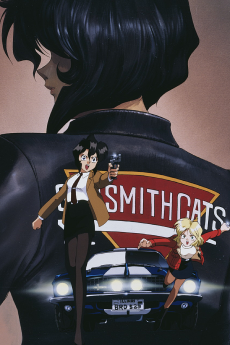 OVA ActionGunsmith Cats
OVA ActionGunsmith Cats ANIME ActionTaiho Shichauzo (TV)
ANIME ActionTaiho Shichauzo (TV) ANIME ActionKiddy Grade
ANIME ActionKiddy Grade
SCORE
- (3.55/5)
TRAILER
MORE INFO
Ended inSeptember 28, 2001
Main Studio Bee Train
Trending Level 1
Favorited by 828 Users













